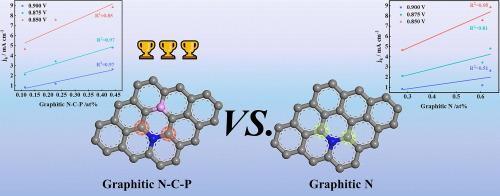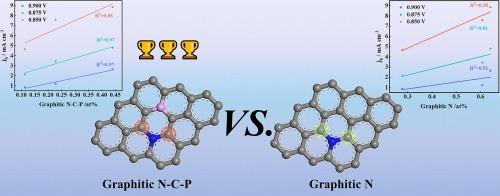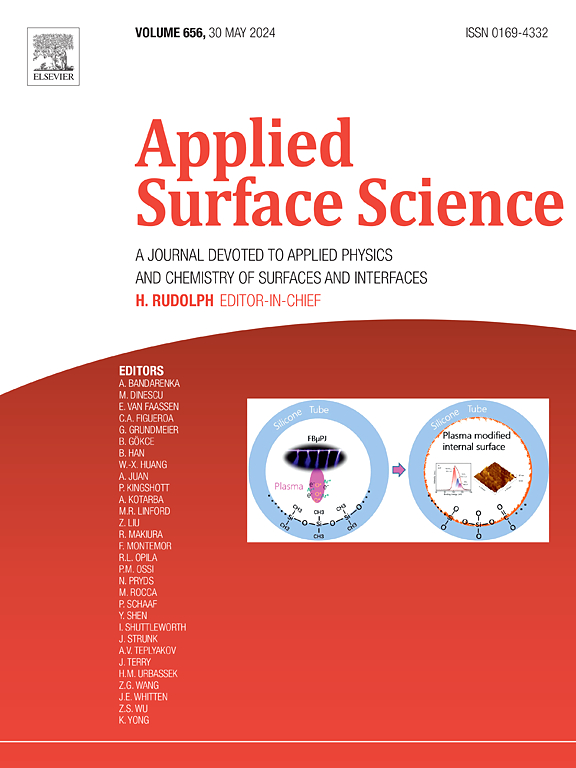Graphitic N-C-P configuration of phosphorus and nitrogen co-doped carbon for boosting the oxygen electroreduction
IF 6.3
2区 材料科学
Q2 CHEMISTRY, PHYSICAL
引用次数: 0
Abstract
The introduction of heteroatoms to carbon-based metal-free electrocatalysts has been verified to be a promising strategy for enhancing catalytic activity in the oxygen reduction reaction (ORR). Nevertheless, it remains a challenge to precisely identify the real active configuration of heteroatoms doped carbon, particularly for dual-heteroatom doping. Herein, a facile strategy is described to synthesize a phosphorus-nitrogen co-doped carbon (PNC) metal-free electrocatalyst. Benefiting from the abundant micropores/mesopores and large surface area of PNC cubes, it delivers a superb ORR activity with a half-wave potential (E1/2 ∼ 0.870 V). More importantly, the experiment results demonstrate the strong correlation between the content of Graphitic N-C-P structure and kinetic current density. The density functional theory (DFT) calculations further unveil that the Graphitic N-C-P structure is the real active configuration of PNC. Notably, the doping of P atom can make the carbon atom adjacent to the Graphitic N be more positive, thereby optimizing the adsorption/desorption of ORR intermediates. Moreover, the assembled Zn-air battery (ZAB) based on PNC delivers outstanding long-term cycling stability for 420 h without significant decay. This work provides a path for the development of green and low-cost energy storage devices.


磷氮共掺杂碳的石墨化 N-C-P 构型可促进氧气电还原
在碳基无金属电催化剂中引入杂原子已被证实是一种提高氧还原反应(ORR)催化活性的有效策略。然而,如何精确识别掺杂杂原子的碳的真正活性构型,尤其是双杂原子掺杂,仍然是一项挑战。本文介绍了一种合成磷氮共掺杂碳(PNC)无金属电催化剂的简便策略。得益于 PNC 立方体丰富的微孔/网孔和较大的比表面积,它具有半波电位(E1/2 ∼ 0.870 V)的超强 ORR 活性。更重要的是,实验结果表明石墨 N-C-P 结构的含量与动力学电流密度之间存在很强的相关性。密度泛函理论(DFT)计算进一步揭示了石墨化 N-C-P 结构是 PNC 的真正活性构型。值得注意的是,P 原子的掺杂可以使石墨 N 相邻的碳原子更加正向,从而优化 ORR 中间体的吸附/解吸。此外,基于 PNC 组装的锌-空气电池(ZAB)具有出色的长期循环稳定性,可持续 420 小时而无明显衰减。这项研究为开发绿色、低成本的储能设备提供了一条途径。
本文章由计算机程序翻译,如有差异,请以英文原文为准。
求助全文
约1分钟内获得全文
求助全文
来源期刊

Applied Surface Science
工程技术-材料科学:膜
CiteScore
12.50
自引率
7.50%
发文量
3393
审稿时长
67 days
期刊介绍:
Applied Surface Science covers topics contributing to a better understanding of surfaces, interfaces, nanostructures and their applications. The journal is concerned with scientific research on the atomic and molecular level of material properties determined with specific surface analytical techniques and/or computational methods, as well as the processing of such structures.
 求助内容:
求助内容: 应助结果提醒方式:
应助结果提醒方式:


